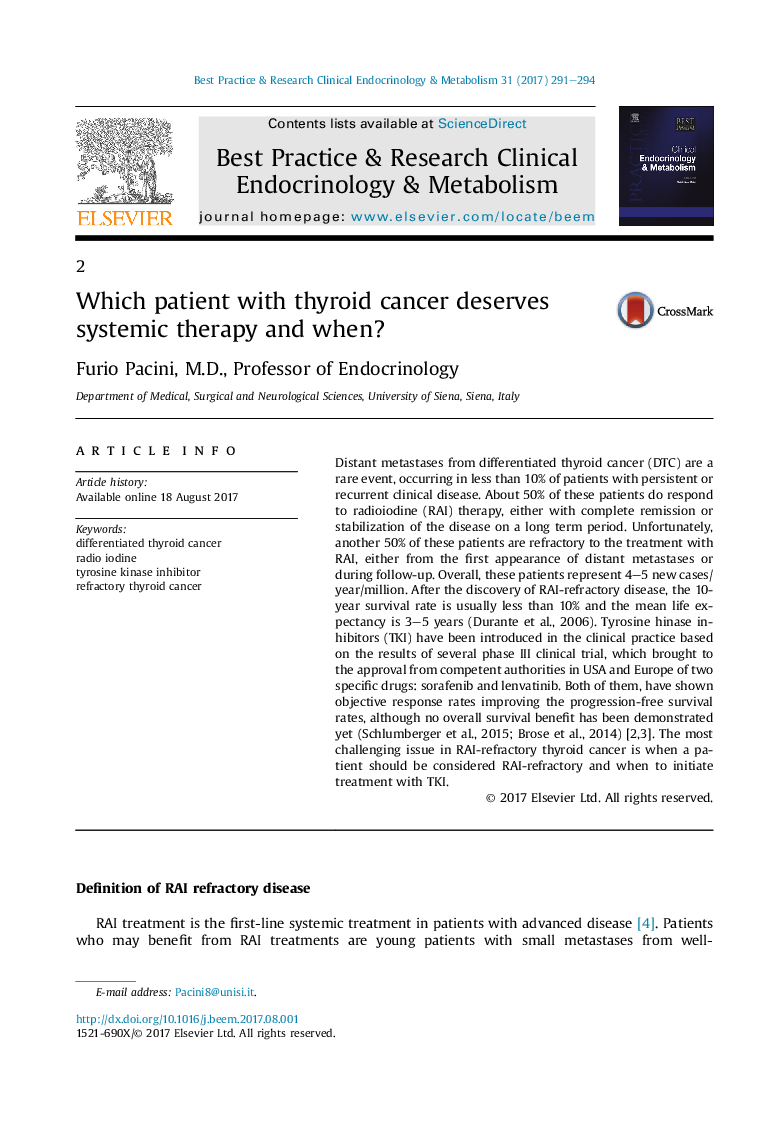| کد مقاله | کد نشریه | سال انتشار | مقاله انگلیسی | نسخه تمام متن |
|---|---|---|---|---|
| 5586624 | 1568660 | 2017 | 4 صفحه PDF | دانلود رایگان |
عنوان انگلیسی مقاله ISI
Which patient with thyroid cancer deserves systemic therapy and when?
ترجمه فارسی عنوان
کدام بیمار مبتلا به سرطان تیروئید سزاوار درمان سیستمیک و زمانی است؟
دانلود مقاله + سفارش ترجمه
دانلود مقاله ISI انگلیسی
رایگان برای ایرانیان
کلمات کلیدی
تشخیص سرطان تیروئید، ید رادیویی، مهار کننده تیروزین کیناز، سرطان تیروئید مقاوم در برابر سرطان،
موضوعات مرتبط
علوم زیستی و بیوفناوری
بیوشیمی، ژنتیک و زیست شناسی مولکولی
علوم غدد
چکیده انگلیسی
Distant metastases from differentiated thyroid cancer (DTC) are a rare event, occurring in less than 10% of patients with persistent or recurrent clinical disease. About 50% of these patients do respond to radioiodine (RAI) therapy, either with complete remission or stabilization of the disease on a long term period. Unfortunately, another 50% of these patients are refractory to the treatment with RAI, either from the first appearance of distant metastases or during follow-up. Overall, these patients represent 4-5 new cases/year/million. After the discovery of RAI-refractory disease, the 10-year survival rate is usually less than 10% and the mean life expectancy is 3-5 years (Durante et al., 2006). Tyrosine hinase inhibitors (TKI) have been introduced in the clinical practice based on the results of several phase III clinical trial, which brought to the approval from competent authorities in USA and Europe of two specific drugs: sorafenib and lenvatinib. Both of them, have shown objective response rates improving the progression-free survival rates, although no overall survival benefit has been demonstrated yet (Schlumberger et al., 2015; Brose et al., 2014) [2,3]. The most challenging issue in RAI-refractory thyroid cancer is when a patient should be considered RAI-refractory and when to initiate treatment with TKI.
ناشر
Database: Elsevier - ScienceDirect (ساینس دایرکت)
Journal: Best Practice & Research Clinical Endocrinology & Metabolism - Volume 31, Issue 3, June 2017, Pages 291-294
Journal: Best Practice & Research Clinical Endocrinology & Metabolism - Volume 31, Issue 3, June 2017, Pages 291-294
نویسندگان
Furio (Professor of Endocrinology),
